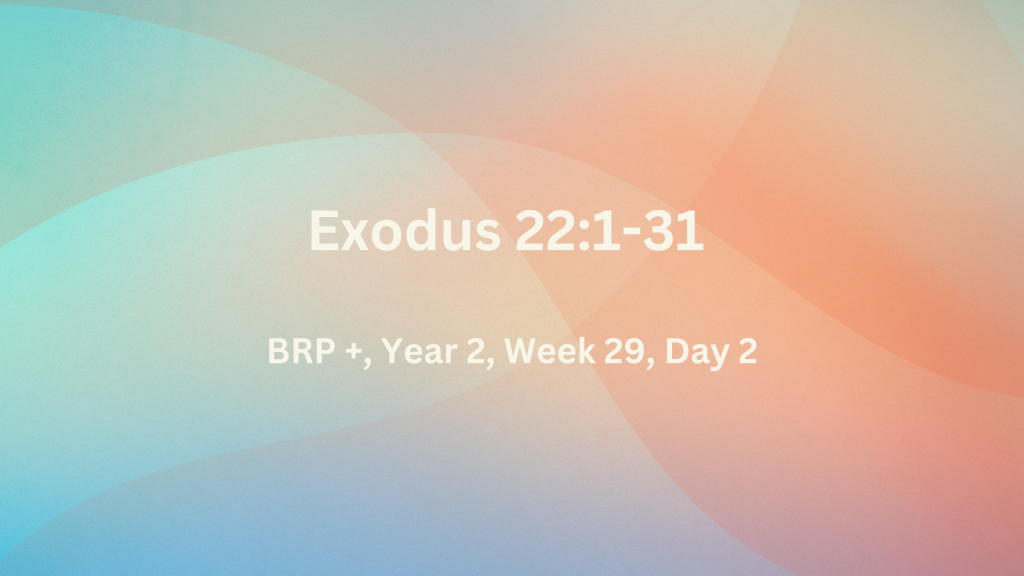Exodus 22:1-31
Q.1. What were the laws of trespassing? Why would God demand that someone be required to pay more than he stole or damaged? Why was restitution of losses built into the law? – (Exo.22:1-15)
Today we constantly hear on the news, cries from victims who want justice. The further we have moved from the Judeo-Christian ethic upon which our western laws were based, the greater the outcry. Under the Law God established for His people: (i) Victims were fairly compensated for losses – even if it meant the perpetrator had to be sold into slavery to repay his debt. (ii) The lawbreaker was punished. It may cost his life, or the offender may be required to repay double … or more. God made it unattractive for lawbreakers to commit a crime: (i) A thief had to repay five oxen for a stolen ox or four sheep for a stolen sheep, if they had been slaughtered or sold (Exo.22:1). (ii) A thief had to repay double a stolen ox, donkey, or sheep (Exo.22:4). (iii) For letting animals graze in a neighbour’s field, the victim had to be repaid with the best field or vineyard (Exo.22:5). (iv) Anyone who started a fire that damaged a neighbour’s property, had to make restitution (Exo.22:6). (v) Those who stole the property of a neighbour had to repay double (Exo.22:7). How could the truth be determined between feuding parties? (i) The parties – shall appear before the judges (Exo.22:8). (ii) Also – the case of both parties shall come before the judges; he whom the judges condemn shall pay double to his neighbour – verse 9. (iii) Further – an oath before the Lord shall be made by the two of them (Exo.22:11). (iv) To prevent false claims – let him bring as evidence; he shall not make restitution for what has been torn to pieces (by wild animals) (Exo.22:13). People were properly compensated for their losses.
Q.2. How was seduction recompensed? When was the death penalty applied? What protection did God prescribe for the defenceless, sojourners, widows, orphans, and debtors? Why? – (Exo.22:16-27)
A man could not seduce a virgin without serious consequences. He was ordered to pay a dowry to the father, and to marry her. If the father refused to let his daughter marry him, the fornicator had to pay the equivalent of a dowry (Exo.22:16-1). Israel was to apply the death penalty for gross breaches of God’s law that would corrupt God’s people: (i) Those involved in witchcraft and sorcery must forfeit their lives – (Exo.22:19). (ii) Those who had sex with an animal were to be put to death (22:20). (iii) Those who sacrificed to idols and other gods were to die (Exo.22:21). Israel knew what it was to be mistreated as slaves in Egypt. They were to treat the defenceless with compassion: (i) Israel was not to oppress any widow or orphan, or God would punish them (22:21-24). (ii) They should lend to the poor in Israel, without charging interest (Exo.22:25). (iii) A pledge was to be returned by sundown Exo.22:26-27). (iv) God promised the defenceless – when he cries out to Me, I will hear him, for I am gracious (Exo.22:27).
Q.3. How were leaders to be treated? What offerings did God demand to ensure that Israel kept their allegiance to Him? Why were the people to refrain from eating some meat? – (Exo.22:28-31)
Because Israel’s leaders were to uphold the law, they were to be respected, even as they respected God (Exo.22:28). All the firstborn of Israel, the first fruits of the crops, and the firstlings of the flocks were to be offered (or redeemed) to God (Exo.22:29-30). This was a token that underscored the fact that God is the Owner of everything. The Laws were given to enable God’s people to be holy, and a unique nation, for – you shall be holy to Me (Exo.22:31).

